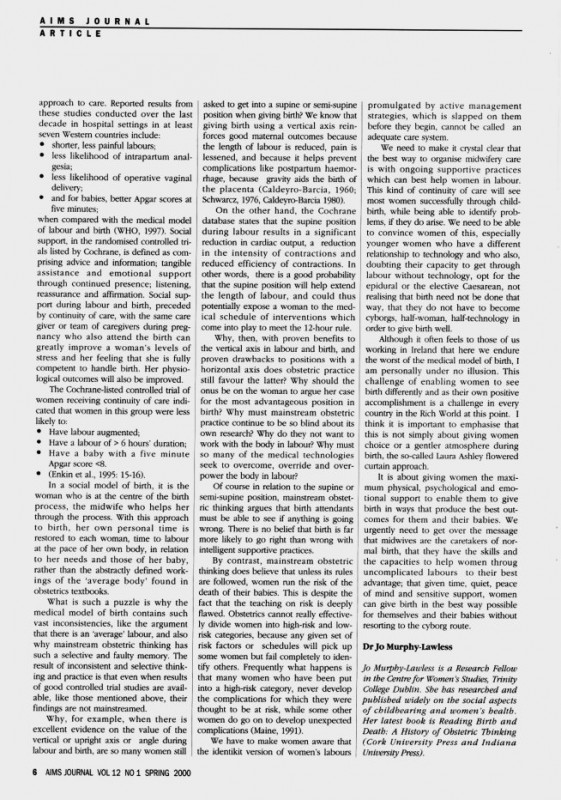AIMS Journal, 2010, Vol 22 No 4
Sara Wickham revisits the first decade of the 21st century, and AIMS is as strong as ever
I have just spent a most enjoyable afternoon reading ten years' worth of AIMS Journals from the 2000s. I found articles that I remembered, revisited lots I had forgotten and saw some in a different light from when I first read them, often because AIMS publishes on topics before they reach that body of knowledge which those of us who spend our lives washing meconium out of our clothes call 'the midwifery literature'.
It was quite a task to pick one out of a whole decade, but my pick is Jo Murphy-Lawless's article, ' Reinstating Women's Time in Childbirth', from AIMS Journal Volume 12 Number 1, Spring 2000, which curiously and fittingly enough was published in the very first issue of the twenty-first century.
Jo highlighted some of what continue to be the most important issues of our time: the very illogical nature of much of what underpins midwifery and obstetric practice and the need for us to acknowledge, study and respect women's rhythms rather than out-of-date theories. This article is reprinted here, so I don't need to tell you how great it was at picking out the salient issues that need to be addressed because you can (re)read it for your self. Instead, I am hoping that I might also be allowed to mention some of those which were on my short-list but which I didn't pick because, well, because AIMS asked me to pick one article, not six!
All of the other articles that I would like to cite from the 2000s are ones that have, I believe, impacted thinking and/or continued to have great value above and beyond their original publication. Beverley's article 'What is normal birth?'1 was, as far as I am aware, the first article that urged us not to confuse 'normal' with 'common', and this is still cited by midwives and organisations who are writing about, and campaigning for, normal birth. In 'The midwife you have called knows you are waiting...' 2 Pat Thomas emphasised the value of women and midwives working together for choice. From my highly biased perspective, as a midwife who seeks to support women to birth on their own terms, as well as someone who has lived and worked in New Zealand where change came about because women and midwives stood together, I couldn't agree more.
Jean Robinson's article on 'The politics of cot death'3 raised some highly pertinent points and questions which remain as relevant today, not just about this particular area but about the way in which, all too often, women are blamed for things that are not their fault. In her article 'Negotiating a normal birth',4 Nadine Edwards brought together the key issues, facts and thinking in this area in such a clear example of the kind of article that, as a midwife, I wish all women could read. And by no means least, Peter Dunn's article on cord clamping5 highlighted important issues which deserve re-reading and which Nadine and I have been revisiting very recently as we undertake the updating of AIMS' booklet on Birthing Your Placenta (yes, it's coming soon, you heard it here first!) I am aware, as I look over this list, that it includes some of those women who have led AIMS for many years; their appearance on it reflects not simply the volume of writing that they have produced for AIMS' Journal (which is, it has to be said, vast, and I only read one decade of Journals) but also the quality and relevance of it to women, midwives and others.
Finally, I hope I have enough space left on my page to congratulate AIMS on reaching her 50th birthday. I want to applaud all past and present members, committee members, writers and others who have made both the Association and the Journal a safe place for women to share and improve their experiences, a much-needed touchstone for those of us who are attending women within (and sometimes without) the maternity services and, perhaps most importantly, a force to be truly reckoned with. May you continue for another 50 years, preferably seeing all the improvements that women will ever need within the next 10, alongside a lasting commitment from everybody in the maternity services that they will continue to listen to, respect and obey birthing women forever after. Then you will be out of a job and can drink tea, eat biscuits and have a well-earned rest at your committee meetings for the 40 years after that.


References
The AIMS Journal spearheads discussions about change and development in the maternity services..
AIMS Journal articles on the website go back to 1960, offering an important historical record of maternity issues over the past 60 years. Please check the date of the article because the situation that it discusses may have changed since it was published. We are also very aware that the language used in many articles may not be the language that AIMS would use today.
To contact the editors, please email: journal@aims.org.uk
We make the AIMS Journal freely available so that as many people as possible can benefit from the articles. If you found this article interesting please consider supporting us by becoming an AIMS member or making a donation. We are a small charity that accepts no commercial sponsorship, in order to preserve our reputation for providing impartial, evidence-based information.
AIMS supports all maternity service users to navigate the system as it exists, and campaigns for a system which truly meets the needs of all.